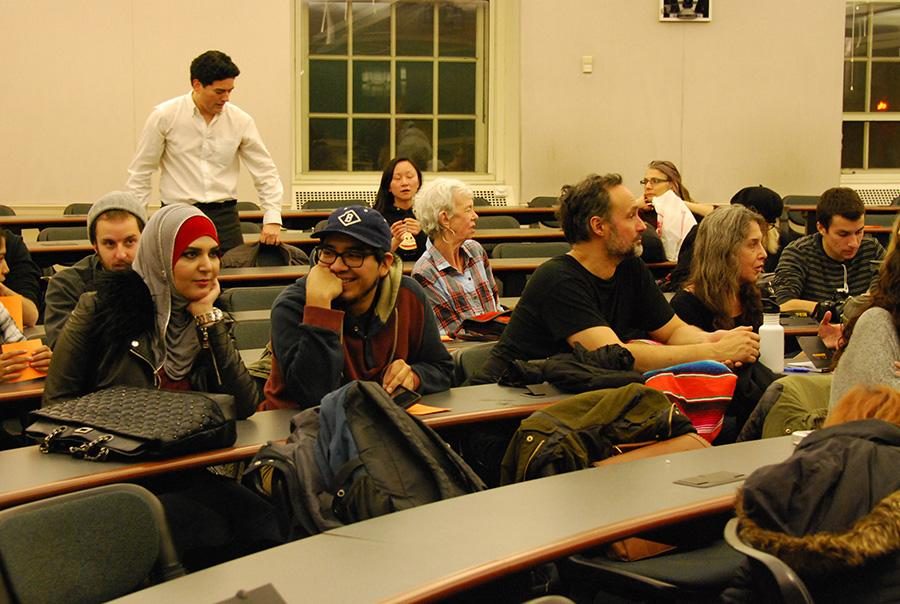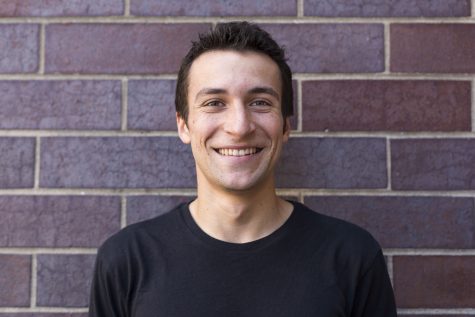SJP hosts discussion on Boycott, Divestment, Sanctions
December 2, 2014
NYU’s Students for Justice in Palestine hosted a discussion on Dec. 1 during which experts explored the Boycott, Divestment and Sanctions movement in the United States, which opposes Israel’s treatment of Palestinians. Launched in 2005, the movement aims to force Israel to comply with international law.
The panel featured Omar Barghouti, co-founder of the BDS movement, Corey Robin, associate professor of political science at Brooklyn College, and J. Kehaulani Kauanui, professor of American studies at Wesleyan University. Held at NYU’s Vanderbilt Hall, the event focused on the techniques of the BDS campaign and the motivations behind it.
Barghouti explained that BDS calls for three crucial rights for Palestinian self-determination: ending the military occupation in the West Bank and Gaza Strip, ending Israel’s system of racial discrimination against Palestinians and the return of refugees.
“Our strategy depended on attacking the brand,” Barghouti said. “Israel, despite its power, is not designed to face such nonviolent challenges.”
Kauanui outlined a three-prong boycott approach to challenging Israeli exceptionalism: academic, institutional and cultural. She said this strategy clarified the issue for those who oppose the policies of Israel.
“For academic and cultural boycott, it is so profoundly radical in the sense that it is so much about anti-normalization, and I think that that is why it’s become a point of rupture for people,” Kauanui said.
Robin pointed out the tensions in universities over the increasingly sharp divide between pro-Israel and pro-Palestine intellectuals.
“The battle of Israel is, first and foremost, a cultural battle,” Robin said. “Campuses are ground zero of that battle.”
Barghouti, however, said he and the movement oppose NYU Tel Aviv, which partners with the Tel Aviv University. The group is calling for the end of exchange programs with all Israeli universities.
“How can NYU have a relationship with a university that discriminates openly so that Palestinian students cannot participate?” Barghouti said. “How can it get away with that, being in bed with an apartheid institution?”
President of NYU’s pro-Israel advocacy group TorchPAC Laura Ad kins, who was not at the event, said the movement only leads to more violence, and boycotting companies with ties to Israel would not end perceived injustices toward Palestinians and Arabs.
“Most companies that operate in Israel employ [Israeli] Arabs and many Palestinians,” Adkins said. “Attempts at boycotting these companies hurt the very people groups like SJP purportedly seek to help.”
Barghouti warned against optimism surrounding any action from the U.S. government.
“Stopping U.S. aid to Israel absolutely is the main sanction we want,” Barghouti said. “But if anyone has the delusion that Congress will wake up and be moral — it won’t. It never was and it never will be.”
A version of this article appeared in the Tuesday, Dec. 2 print edition. Email Alex Bazeley at [email protected].


























































































































































Arafat • Dec 3, 2014 at 6:58 am
As a final note, look up Israel’s and the Palestinians’ relative political and civil rights ratings at Freedomhouse.org. Israel’s are close to the best possible while those under both Hamas and Fatah are almost the worst possible.
Arafat • Dec 3, 2014 at 6:57 am
If you are a femalel student (or alumna) who is thinking about going to “Palestine” to help protest against the Evil Zionists, I suggest that you first read “Female Palestinian Peace Activists Suffer Sexual Harassment, Rape From Palestinians” (just Google on the title). You might want to reconsider.
As a final note, look up Israel’s and the Palestinians’ relative political and civil rights ratings at Freedomhouse.org. Israel’s are close to the best possible while those under both…
Arafat • Dec 3, 2014 at 6:56 am
Google “gays” and “Palestinians” to see how gay people are treated by the people who are calling for boycotts, divestment, and sanctions against Israel. The first search result is titled, “Palestinian gays flee to Israel”
Google “Palestinian” and “honor killings” to see how women are treated by the people who are calling for boycotts, divestment, and sanctions against Israel.
If you are a femalel student (or alumna) who is thinking about going to “Palestine” to help protest…
D Law • Dec 2, 2014 at 10:36 am
You left out the critical fact that Mr. Bargouti got his PhD in philosophy from Tel Aviv University. That does not seem to support his hypothesis that TAU is “a university that discriminates openly so that Palestinian students cannot participate”
Anonymous • Dec 2, 2014 at 10:09 am
Barghouti says that Palestinian students “cannot participate” in Tel Aviv University. Yet it is common knowledge that Barghouti himself attended that university since 2009. So either he is not a Palestinian, or he is lying. Either way, that should definitely tell you something about the kind of people associated with the BDS campaign.
Abraham Bruck • Dec 2, 2014 at 9:48 am
There is nothing PRO Palistinian about BDS; it is 100% ANTI Israel and ANTI Semitic.
The goal of the founders of the BDS movement, as explicitely stated by them, is the destruction of the Jewish State of Israel, replaceing it with yet another terrorist entity.
Think about it:
1) What did the shutting down of SodaStream accomplish, except that a few hundred well paid Arabs are now unemployed?
2) What does not buying products from the West Bank accomplish, except impoverish the Arabs…